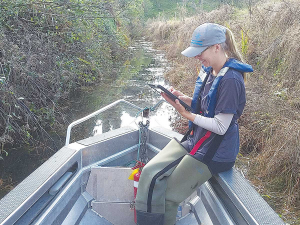Environment Canterbury urges buyers to check wastewater systems on rural properties
Buying or building a rural or semi-rural property? Make sure you know where the wastewater goes, says Environment Canterbury.
 Bay of Plenty Regional Council contractor Courtney Williams assisting whitebait research in a small stream flowing into the Aongatete River, near Katikati.
Bay of Plenty Regional Council contractor Courtney Williams assisting whitebait research in a small stream flowing into the Aongatete River, near Katikati.
Purpose-built ponds that provide a safe haven for whitebait are being hailed as a success by Bay of Plenty Regional Council staff, following the results of a recent overnight trapping operation.
The trapping confirmed that the newly created habitat on the banks of the Whakatāne River has been very successful – whitebait were found in abundance using the ponds, as were bully, shortfin and longfin eels, juvenile mullet, and triplefins.
The ponds were excavated in autumn 2020 by the council’s rivers and drainage team near the Ferry Road access point. The area surrounding the small, interconnected ponds was then planted with more than 3,000 native plants and shallow areas were created around them to improve possible spawning areas.
They’re connected to the river by small channels to allow tidal fluctuations that regularly refresh the pond system, and have been designed to retain plenty of water, even at low tide. The ponds are located alongside a low-lying wet area that already has good wading bird habitat.
Rivers and drainage operations manager Bruce Crabbe said that these grassed areas within man-made stopbanks are a common sight across Bay of Plenty farming areas.
“This work is part of our move to improve the amenity and better reflect the natural river movements and native habitats that they foster. It is great to see how well this particular spot has worked. From almost the very start we saw small inanga species in the ponds, but there are just so many more now and a wide range of other native species as well. It is a real win,” Crabbe said.
Graduate environmental scientist Erin Bocker worked with Regional Council’s freshwater ecologist, Alistair Suren on the research. She said that the results had “exceeded expectations”.
“We deployed six fyke nets and 12 gee-minnows overnight and found a very healthy population of white bait, but common bully, shortfin and longfin eels, juvenile mullet, and triplefins were using the ponds as well.
“The ponds appear to be successfully acting as a refuge and nursery for a range of fish species and this habitat value will increase further as the plants grow and establish around the ponds.
“It’s an important example of how available fish habitat can be enhanced, while maintaining flood protection. So we [the science team] will continue to monitor this site and others like it to guide future projects,” Bocker said.
The council is asking that people don’t net whitebait or fish in the ponds so the juveniles have a chance to develop.
Voting has started for the renewal of DairyNZ's milksolids levy.
The most successful catchment groups in NZ are those that have 'a source to sea' approach.
Associate Agriculture Minister and Manawatu dairy farmer Andrew Hoggard says the free trade agreement (FTA) negotiated with India is not a bad deal and his party, Act, will support it when it goes before Parliament.
Newly released data from Environment Canterbury (ECan) Farm Environment Plan (FEP) audits are showing a dramatic lift in environmental performance across the region.
A solid recovery of global dairy prices this year makes a $9.50/kgMS milk price almost a shoo-in for this season.
As New Zealand marks the United Nations’ International Year of the Woman Farmer 2026 (IYWF 2026), industry leaders are challenging the misconception that women only support farming.
OPINION: Fonterra may be on the verge of selling its consumer business in New Zealand, but the co-operative is not…
OPINION: What does the birth rate in China have to do with stock trading? Just ask a2 Milk Company.